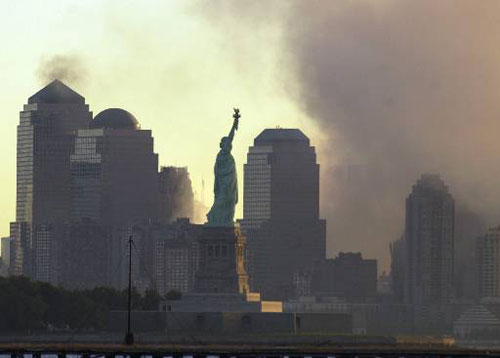After the Next 9/11
Each of the 95 times President Bush mentioned Al Qaeda in his South Carolina speech last week, and each of the innumerable times in coming days that his disciplined minions will push the Iraq-is-about-Al-Qaeda button, the real message is, of course, 9/11. If we don't win in Iraq, the Bush case goes, the terrorists will kill you and your children in the air, at the mall and in your bed.
Set aside for a moment the baldfaced Bush lie that Al Qaeda accounts for more than a sliver of the terrorism in Iraq. Ignore the convenient Bush amnesia of the cause for Al Qaeda's presence in Mesopotamia: his own invasion-of-choice. Forget the absurdity of fight-them-there-so-they-won't-fight-us-here: a defeat of Al Qaeda in Iraq, even if it were militarily and politically possible, even if we were willing to spill all the blood and spend all the treasure required to accomplish it, will not cause the cells of terrorists already in America to disband, nor will it so bum, depress or demoralize the ferocious jihadists already plotting against us in encampments and networks around the world that they will abandon their zeal for revenge and seek new careers in hedge fund management or search engine design.
Instead, focus on the likelihood of another 9/11 in America, even if Bush prevails in handing the Iraq war to his successor, even if the Cheney-Kristol wing of the Republican Party gets all it wants from this and future Congresses, even if Joe Lieberman gets his war in Iran, even if Rudy Giuliani gets to wear macho-man drag as our next President, even if someone produces Osama Bin Laden's head on a pike -- or even, alas, if an American withdrawal begins in September or March or in January, 2009. No matter what happens next in Iraq, something terrible is going to happen in America.
This is not defeatism. It is facing reality. I wish there were enough money to secure all our ports and infrastructure; to lower to zero the probability that the A.Q. Khan network, or some purveyor of ex-Soviet loose nukes, could penetrate our border with an atomic device; that bioterrorism could be decisively prevented by counterterrorism; that jihadi malaise, or Obamian public diplomacy, or whatever other cure for global hatred you favor, could conquer the evil that George W. Bush pretends he can deliver us from.
But no more than King Canute could stop the tide, no more than a Big One in California can be prevented, no more than the hundred thousand people who will die in accidents this year will evade their untimely ends, an act of domestic terrorism is inevitable. What counts is how we think about it right now, how we prepare today for when it happens tomorrow, and how we handle it -- politically, emotionally, morally -- when, as it must, it occurs.
Is there any doubt that the Bush administration, and its dead-ender allies in the Republican Party and the media, will use an act of domestic terrorism as a fresh opportunity to further demonize their political opponents and further compromise the Constitution? Will they truly be able to resist the temptations of martial law, emergency powers, and the phony prerogatives of the unitary executive in wartime? In Britain, in Israel, in Spain, in Ireland, we have seen political leaders decline the invitation to demagoguery that domestic terrorism has offered, and instead to put violence in perspective, to refuse to compromise reason and democracy, to summon their citizens to remain themselves rather than become their enemies. When the unthinkable happens to us again, will the politicians who pissed away the unity following 9/11 in the sands of Iraq have the moral wherewithal to remind us that no matter how grief-stricken we may be, the sky has not fallen and the republic has not failed?
If I could manage to be smarter about risk than I usually am, I would worry less about the possibility of terrorism, and more about the probability that the same chickenhawks who exploited it before to sell us on war without end, will exploit it again to sing the virtues of temporary fascism.






























No comments:
Post a Comment